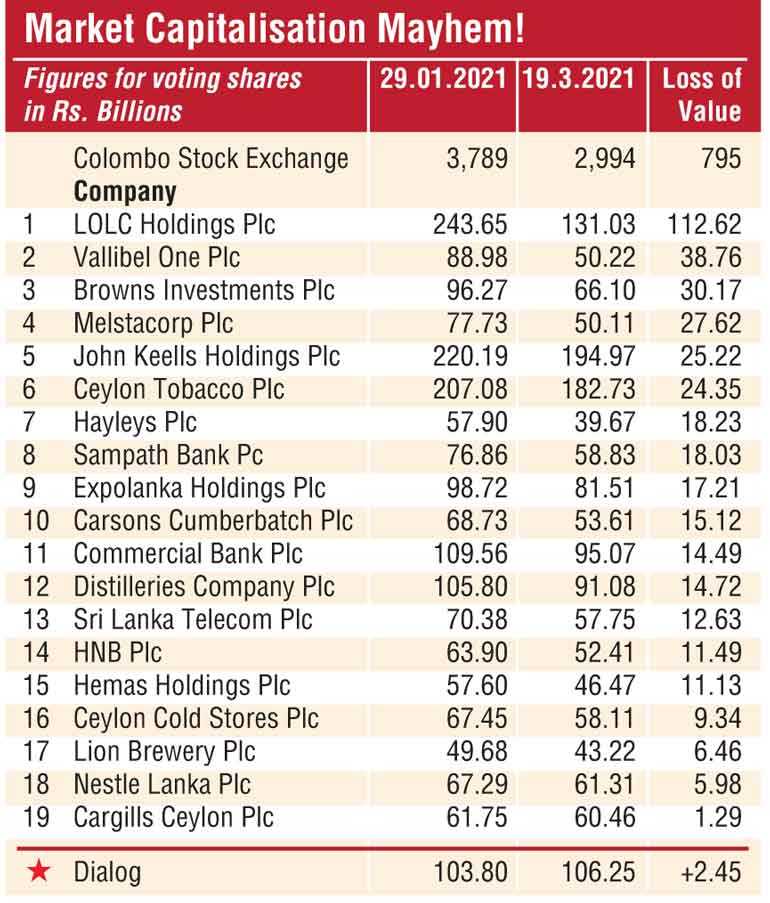Wednesday Feb 25, 2026
Wednesday Feb 25, 2026
Monday, 22 March 2021 03:51 - - {{hitsCtrl.values.hits}}
By Nisthar Cassim

The Colombo Stock Exchange has seen nearly Rs. 800 billion in value wiped off between Friday last week and the all-time high level achieved in January but participants of the Bourse are bracing to recoup lost value on the belief economic upturn is evident amidst resilient financial performance by listed corporates.
As per an analysis by the Daily FT except one, all 19 of the top 20 listed companies accounted for 50% for the loss of overall market value.
From near 30% gain in indices end-January, the year to date-increase has tumbled raising serious concerns among investors and capital market promoters. The year to date gain of All Share Price Index was just 1.18% as of Friday and S&PSL20’s was 4.52%.
In January, the ASPI’s highest closing was 8,812 points after hitting an intra-day peak of 9,025. On Friday, it closed at 6,854 points, down by around 2,000 points since.
Last week the CSE’s Markey Capitalisation dipped below the Rs. 3 trillion mark to Rs. 2.99 trillion, whereas it was Rs. 3.78 trillion as at end-January.
Of the top firms, only the solid Dialog Axiata, the largest telecom firm, bucked the trend as its market capitalisation rose between end-January and last week.
As expected, some of the new stocks fancied by investors have fallen sharply whilst the long-standing and sound companies have seen a lesser drop reinforcing the importance of investing in fundamentals.
However, analysts said the management cannot be held responsible for the sharp fall of company’s stock price as the original rise was due to investors own assessment or perception of value.
Some analysts admitted that the dizzy heights to which the Colombo stock market rose in January were unwarranted. Others claim bullish investor sentiments evident at the start of 2021 were killed by regulatory action whilst some opined that new retail investors flooded the market hoping to get rich too fast.
The absence of local institutional investors and foreign funds or lack of buying by them was another reason why the early momentum couldn’t be sustained. It was anticipated that institutional (foreign and local) would follow after retailers seeing value. Net foreign selling year to date is nearing Rs. 16 billion whilst last year the net outflow was Rs. 51 billion.
The market Price Earnings Ratio (PER) stood at 11.25 times by end-2020 and rose to 14.41 times by end-January. By last week it has reduced to 12.82 times which many believe makes CSE still attractive given impressive corporate earnings and dividends announced so far. This is despite the economy in 2020 suffering a 3.6% contraction though the last quarter saw a 1.3% improvement in Gross Domestic Product (GDP).
Companies with their financial year ending 31 March are expected to release improved earnings as per analysts thereby reiterating the resilience and the rebound despite COVID-19 global and local impact.
Early this month, Softlogic Stockbrokers revealed that October-December quarter produced Rs. 85 billion in listed company earnings — the highest-ever in the history of CSE. It said the 33.3% YoY growth was a strong sign of the earnings momentum continuing beyond the pent-up demand cycle expected in Q3 2020, as the QoQ earnings grew 16% for Q4 2020.
“The growth is in testament to the favorable climate for local companies during the post-lockdown period backed by import protectionism, economic stimulus and USD depreciation, which proved to benefit the local industries and export segments,” Softlogic said.
It also noted that the exceptional performance was achieved despite the continuation of localised lockdowns during the period from October to December and the lower levels of mobility as the country faced the second wave of COVID.
Money and Capital Markets State Minister Nivard Cabraal in a tweet yesterday said: “Investors who make investments in CSE stocks must base decisions on a 1-5-year time horizon, they will gain significantly as our PE ratios are now at highly depressed levels.”
Asia Securities on Thursday said: “We maintain that current valuations provide an attractive entry point based on our earnings expectations for FY22E/CY21E.”
Capital Trust opined: “While we believe that the market has now largely bottomed out, we advise investors to refrain from taking short-term trading positions and adopt a selective stock-picking strategy with a focus on investing in quality companies that have robust cash flow generating abilities and long-term fundamental strength.”
Acuity Stockbrokers in its latest macro and market strategy report said accommodative policies to drive the stock market revival. It said a stable Government is formed post the Presidential and Parliament Elections and will be in power for the next four years. However, it said the country’s ability to meet its external debt obligations is the primary concern for 2021, given the falling trend observed in foreign reserves.
“We are cautiously optimistic that the Government would successfully obtain bilateral and multilateral loans and currency swaps. CBSL to continue the use of accommodative monetary policy in the medium term to support the revival of the economy. SDFR and the SLFR are kept at 4.5% and 5.5% since July 2020,” Acuity said.
Noting that the ASPI rose over 10% during 2020 and also reached the all-time high of 8,668 in January 2021, Acuity expects the ASPI to settle around the 7500-8000 range during 2021.
“The overall outlook for 2021 remains positive due to unprecedented policy stimulus measures made by the current stable Government, along with CBSL,” Acuity said, adding improved domestic economic sentiments, primarily driven by recent progress on vaccines and decline in daily COVID-19 cases, as well as strong recovery witnessed in the global economy, were other factors.